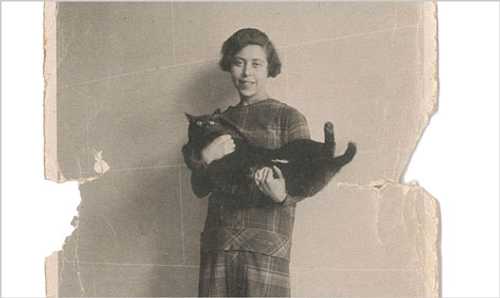
Homefront
Irene Némirovsky, novelist, with furry friend.
Mme. Denise Epstein (family photo, freed to public domain on general license)
Irene Némirovsky, photographed in Paris in the 1920s, with family cat "Kissou". Irene was born in Kiev in 1903 to wealthy Jewish parents (her father made his first fortune making matches - the lighting-fire sort, and then went into banking). Forced to flee their home by the Russian Revolution, the family settled in Paris, where they continued to pursue a wealthy, privileged lifestyle. Irene published her first novel, "Daniel Golder", in 1929, and quickly became an established author in French. Her literary admirers included even a number of anti-Semitic writers. Meanwhile, in 1926, she had married banker Michel Epstein, a fellow Russian-Jewish émigre. They had two children, Denise and Elizabeth. French society at the time had a strong strain of anti-Semitism, a phenomenon that had been enhanced by the Dreyfus Affair around the turn of the previous century, and the migration to France (and to much of western Europe) of many poor and relatively poor Jews displaced by pogroms in the Russian Empire. A small minority of wealthy Jews, who were long-established in the country were, relatively speaking, immune from this prejudice. Némirovsky and Epstein stood somewhere between the two groups. It was perceived that French citizenship might provide protection to its Jewish holders in the event of war bringing France under Nazi influence. Accordingly, the couple applied for French citizenship as war became more likely; the application was supported by friends and endorsed by their personal standing but was, not so much refused as ignored. They were more successful in achieving the "conversion" of the family to Roman Catholicism, 1939. With the arrival of the Germans in Paris in 1940, the family's situation shifted considerably for the worse. Michel Epstein lost his banking position, and the position of Jews in Paris became more and more difficult. Irene and Michel moved, first the children, then the whole family, to Issy-l'Eveque, the home of the children's nanny. The town was actually in the German-occupied area, but close to the Vichy area. Behind the scenes, the Vichy government had embarked on a process of trading increased collaboration with the Germans in return for retaining some control over government, both in the occupied and non-occupied areas. An easy area in which to trade was increasing collaboration with anti-Jewish measures. The first to feel the effects of this were the less-prosperous Jewish émigres, concentrated in and around Paris. However, by the end, even those long-established, fully assimilated Jewish families were not immune to the anti-Jewish laws of Vichy and the Germans. This process caught up with Irene Némirovsky on 19 July, 1942, when French police arrested her as a "stateless person of Jewish descent". She was rapidly transferred to German custody and then to Auschwitz, where she died of typhus on or about 17 August. Michel Epstein followed along the same course some months later; he died in the gas chambers. It is doubtful whether French citizenship would have done more than delay the process by, prehaps, a year. The children were hidden by a succession of friends and religious establishments, and survived the war. Having been banned by the Nazis and Vichy, Irene Némirovsky's works fell into literary obscurity. This changed when her daughters finally read (around 1998) the contents of a large notebook which they had saved during their period in hiding and since. They discovered that, rather than their mother's diary, the notebook contained the text of two novellas, with notes for three more. These novellas, along with the notes, were published as "Suite Francaise" (French) in 2004 with great success in France, and have subsequently been translated into English. This led to a widespread renewal of interest in Némirovsky's works, well deserved. In her "Suite Francaise" notebook, Némirovsky wrote, "Since (this country - France) rejects me, let us watch it lose its honour and its life". A harsh judgement, perhaps, in relation to France in general. In relation to the craven politicians, pro-Nazi fascists and calculating bureaucrats of Vichy ? Perhaps not. In sadness, JR.
2097 Views
6/26/2013
